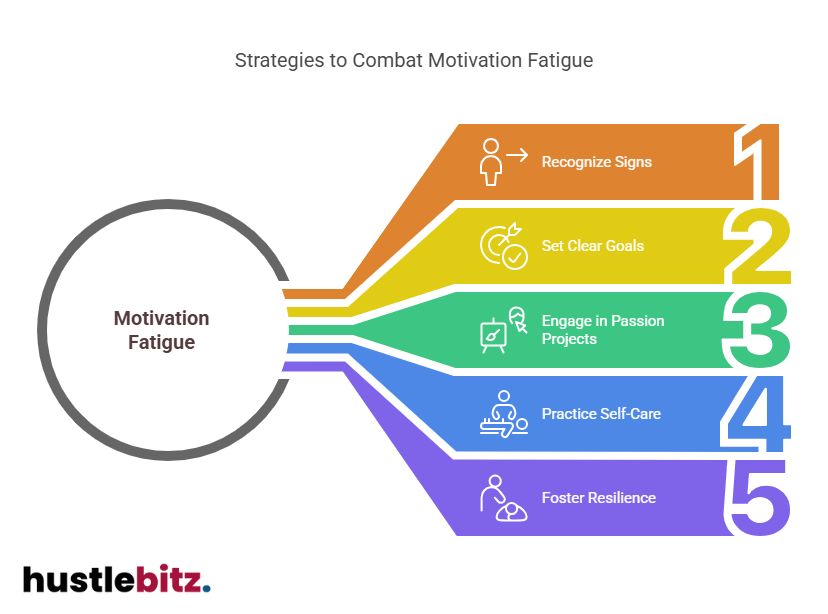Motivation fatigue can significantly impede both personal and professional advancement. This condition often arises from prolonged stress, repetitive tasks, and unmet goals. Signs include a decline in enthusiasm, disengagement, and emotional exhaustion. To overcome this fatigue, engaging in passion projects, setting clear goals, and practicing mindfulness can reignite your drive. Additionally, integrating self-care routines enhances resilience and emotional well-being. Utilizing accountability partners and pursuing creative hobbies further nurtures motivation. By understanding the underlying factors and adopting effective strategies, you can reclaim your enthusiasm and purpose. Discovering practical methods to renew your focus is pivotal.
Key Takeaways
- Recognize signs of motivation fatigue, such as disengagement and emotional exhaustion, to address issues early.
- Set clear, achievable goals that align with personal values to create a sense of purpose.
- Engage in passion projects and creative hobbies that resonate with your interests to reignite enthusiasm.
- Practice self-care routines, including mindfulness and stress management, to replenish physical and emotional energy.
- Foster resilience by developing coping strategies and maintaining support networks during challenging times.

Understanding Motivation Fatigue

Motivation fatigue occurs when individuals experience a significant decline in their drive and enthusiasm, often resulting from prolonged stress, repetitive tasks, or unmet goals. Understanding this phenomenon requires a comprehensive analysis of various motivation theories, such as Maslow’s Hierarchy of Needs and Self-Determination Theory, which emphasize the roles of intrinsic drivers—such as personal fulfillment and mastery—and external influences, including rewards and social recognition.
Central to overcoming motivation fatigue is the practice of effective goal setting. Establishing clear, achievable objectives not only provides a roadmap for progress but also fosters a sense of purpose. When individuals align their goals with intrinsic values, they tend to experience increased motivation. Conversely, a lack of alignment can lead to disinterest and disengagement.
Energy management plays a crucial role in sustaining motivation levels. Recognizing when to rest or recharge is essential. High-performance individuals often employ strategies to optimize their energy throughout the day, balancing periods of intense focus with adequate breaks. This not only prevents burnout but also enhances overall productivity.
Ultimately, addressing motivation fatigue involves a multifaceted approach. By integrating insights from motivation theories, harnessing intrinsic drivers, acknowledging external influences, engaging in effective goal setting, and managing energy wisely, individuals can rekindle their enthusiasm and drive. This holistic understanding lays the foundation for overcoming the challenges associated with motivation fatigue, enabling a more resilient and focused pursuit of goals.
Signs of Motivation Loss

A noticeable decline in enthusiasm and engagement often serves as a key indicator of motivation loss, manifesting through various behavioral and emotional signs.
Individuals experiencing this phenomenon may exhibit symptoms of disengagement, characterized by a withdrawal from activities and interactions that once brought joy and fulfillment. This disengagement can escalate into emotional exhaustion indicators, such as persistent fatigue and irritability, further compounding the lack of motivation.
Moreover, productivity decline signs become increasingly apparent when tasks that were previously manageable start to feel overwhelming or insurmountable. This downturn in productivity frequently results in decision-making paralysis, where individuals find themselves unable to make even the simplest choices due to a pervasive sense of uncertainty and fear of failure. Such paralysis can lead to a stagnation of progress, with individuals feeling trapped in a cycle of inaction.
Goal setting procrastination emerges as another critical symptom of motivation loss. The initial excitement for setting and pursuing goals diminishes, replaced by a tendency to postpone or avoid planning altogether. This procrastination not only hinders personal and professional growth but also reinforces feelings of inadequacy and frustration.
Recognizing these signs is the first step in addressing motivation loss. By identifying symptoms such as disengagement, emotional exhaustion, and procrastination, individuals can begin to implement strategies to reclaim their drive and reinvigorate their pursuits, ultimately fostering a more productive and fulfilling life.
Causes of Drive Depletion

Experiencing prolonged stress and overwhelming responsibilities can significantly contribute to drive depletion, leading individuals to feel drained and disengaged from their goals. One of the primary burnout triggers is the incessant pressure to achieve perfection, which often results in emotional exhaustion. This relentless pursuit of flawlessness can erode motivation, as individuals may become paralyzed by fear of failure, thereby avoiding tasks that once inspired them.
Additionally, goal misalignment can exacerbate feelings of disconnection from one’s aspirations. When personal values and ambitions do not resonate with current objectives, the drive to pursue success diminishes. This misalignment can create a sense of futility, prompting a withdrawal from the very goals that were once a source of inspiration.
Moreover, external distractions in our increasingly connected world can divert focus and energy away from meaningful pursuits. The constant influx of information and competing priorities can lead to cognitive overload, further straining one’s ability to maintain motivation.
In tandem with these factors, the cumulative effect of emotional exhaustion can leave individuals feeling overwhelmed and disengaged. This state often results from the interplay of stressors, perfectionism pressure, and misaligned goals, creating a cycle that is difficult to break.
Recognizing these causes of drive depletion is essential for those seeking to regain their passion and commitment to their objectives. Understanding these barriers allows for a more tailored approach to recovery and revitalization in the pursuit of excellence.
Strategies to Reignite Passion

Reigniting passion often requires a strategic approach that focuses on reconnecting with personal values and redefining meaningful goals. One effective method is to engage in passion projects that align with your core interests and aspirations. By actively pursuing these projects, individuals can cultivate a sense of purpose that invigorates their drive.
Goal visualization plays a crucial role in this process. Visualizing desired outcomes not only clarifies objectives but also enhances motivation by creating a vivid mental picture of success. This practice can be complemented by incorporating positive affirmations into your daily routine. Affirmations help reinforce self-belief and can serve as a powerful tool to counteract negative thoughts that contribute to motivation fatigue.
Additionally, enlisting accountability partners can significantly boost your commitment to rekindling your passion. These partners provide support, encouragement, and constructive feedback, fostering an environment conducive to growth and accountability. Collaboration with others, particularly those who share similar interests, can reignite your enthusiasm and inspire new ideas.
Engaging in creative hobbies also offers a valuable outlet for self-expression and rejuvenation. Whether it’s painting, writing, or crafting, these activities allow for exploration and experimentation, which can invigorate one’s passion.
The Role of Self-Care
Self-care plays a pivotal role in sustaining motivation and combating fatigue, as it nurtures both physical and mental well-being, ultimately enhancing one’s ability to pursue passions and achieve goals. By integrating self-care practices into daily life, individuals can create a solid foundation for emotional well-being, thereby fostering a more resilient mindset.
Emphasizing stress management is crucial in this journey. Chronic stress not only depletes energy but also hampers cognitive function, leading to diminished motivation. Engaging in healthy routines, such as regular exercise, balanced nutrition, and adequate sleep, serves to replenish physical energy and enhance mental clarity. These routines act as a catalyst for personal growth, allowing individuals to harness their full potential.
Moreover, self-care practices extend beyond the physical realm. Activities that promote relaxation, such as mindfulness meditation, journaling, or engaging in creative pursuits, are instrumental in restoring emotional equilibrium. By prioritizing emotional well-being, individuals can effectively mitigate feelings of fatigue and cultivate a more positive outlook.
Incorporating self-care into one’s lifestyle is not merely a luxury but a necessity for those striving for mastery in their pursuits. It empowers individuals by equipping them with the resilience needed to navigate challenges, thus reinforcing the intrinsic motivation required to achieve their goals.
Building Resilience in Adversity
Building resilience in adversity is essential for navigating life’s challenges, as it empowers individuals to adapt, recover, and thrive despite setbacks. Resilience building is not merely a passive trait; it is an active process that involves developing mental toughness and emotional strength. By enhancing these characteristics, individuals can better manage adversity, turning potential crises into opportunities for growth.
Effective adversity management requires the implementation of robust coping strategies. These strategies, such as reframing negative thoughts and fostering a growth mindset, enable individuals to reinterpret challenges as stepping stones rather than insurmountable barriers. Additionally, cultivating a support network can provide the necessary encouragement and perspective during tough times, reinforcing one’s resolve.
Moreover, resilience building is closely linked to the practice of self-reflection. By evaluating past experiences and understanding one’s responses to adversity, individuals can identify patterns that either hinder or promote resilience. This self-awareness fosters emotional strength, allowing for more informed decision-making in future challenges.
Ultimately, developing resilience is a lifelong endeavor. It requires commitment to continuous learning and self-improvement, as well as the willingness to embrace discomfort as a catalyst for change. By prioritizing resilience building, individuals not only enhance their capacity to withstand adversity but also position themselves to seize new opportunities.
In this way, mental toughness and emotional strength become invaluable assets, enabling the pursuit of goals and aspirations even in the face of adversity.
Mindfulness for Renewed Focus

Mindfulness practices can significantly enhance focus and clarity, allowing individuals to navigate distractions and reclaim their inner drive. By cultivating a heightened awareness of the present moment, one can effectively mitigate the effects of motivation fatigue that often arise in our fast-paced lives.
Central to mindfulness is mindful breathing, a technique that anchors you to the here and now. Engaging in deliberate breathwork not only calms the mind but also facilitates a state of heightened concentration.
Complementing this practice, focused journaling serves as an invaluable tool to articulate thoughts and intentions, enabling a structured pathway towards goal achievement. This method encourages reflection and clarity, transforming nebulous ideas into actionable plans.
Incorporating a gratitude practice further refines one’s mental landscape. By consciously acknowledging and appreciating the positive aspects of daily life, you foster an optimistic mindset that fuels motivation. This practice enhances sensory awareness, allowing individuals to fully engage with their surroundings and experiences, thus enriching their capacity for focus.
The synergy of these mindfulness techniques cultivates an environment where distractions are minimized, and inner drive is revitalized. As you embrace the present moment through these practices, you lay the groundwork for sustained focus and enhanced productivity.
Final Thoughts
Motivation fatigue can hinder both personal and professional progress, but understanding its root causes and implementing strategies to overcome it can reignite your drive. By practicing mindfulness, setting clear goals, engaging in passion projects, and nurturing self-care routines, you can replenish your energy and motivation. Building resilience in the face of adversity and seeking support through accountability partners further reinforces your efforts. These practices help you maintain focus, stay resilient, and pursue your goals with renewed enthusiasm, leading to long-term success and fulfillment.




